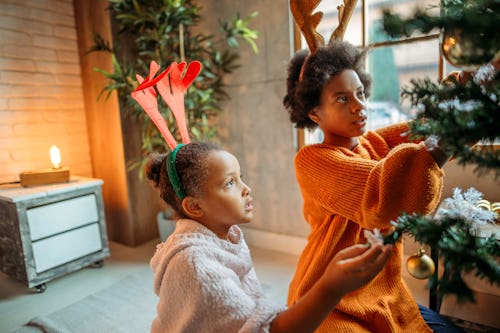
If you celebrate Christmas, you know this time of year can seriously affect your mood and thinking. As a child, I was always excited at the prospect of twinkling lights, family time, no school, and of course, gifts. In fact, I’m certain the holidays gave me a boost of feel-good brain chemicals. And now as a parent, I see my own child light up at the idea of the holidays, and yours might, too. Which may have you wondering just how Christmas affects your kid's brain. What makes them feel good about this time of year, what’s got them worried (if anything), and how can we support them through it all?
The Highs And Lows of The Christmas Season
For one, there’s the anticipation factor.
“Counting down anything can result in feelings of excitement, anxiety, frustration, fear and happiness to name a few,” says Dr. Bethany Cook, Licensed Clinical Psychologist, mother of two, and author of For What It’s Worth: A Perspective on How to Thrive and Survive Parenting Ages 0-2. She explains this in turn releases dopamine in the brain, which can make one feel happy.
Additionally, a lot of how your brain processes Christmas eve and Christmas day depend on what’s going on around them, including in terms of inequities.
“Not all children experience positive feelings around the holidays. Increases in parental stress may be released in an abusive manner toward a child, (there may be) food shortages, concerns about heat in the home, etc.,” says Dr. Cook.
While most kids who celebrate Christmas enjoy this time of year, it’s important to be mindful of the strong emotions little ones might be having, and how our own feelings and actions might affect them.
“The lows feel bottomless and the highs seem limitless,” says Dr. Cook. Because of this, she advises adults to have more patience, especially if kids are having seemingly “out of control” responses to things good and bad.
“Their bodies’ hormones are releasing and metabolizing a little extra around the holidays which makes kids tired, irritable and more easily thrown off their game. Be patient with them and yourself,” she says.
If a parent is feeling depressed, Dr. Cook says it will definitely impact and shape a child’s view of the holidays. But even if they aren’t, she says kids are quick to pick up on changes around them and have negative responses.
Focus on The Positive
For families who enjoy keeping up their holiday traditions, the benefits really are substantial.
A review of 32 studies over the past 50 years published in the American Psychological Association's (APA) Journal of Family Psychology found that family routines and rituals (including Christmas traditions) had a positive impact on children’s health, adolescents’ sense of identity, stronger family relationships, and more.
Additionally, having a sense of nostalgia around the holidays can also be beneficial. While younger children might not feel that just yet (their lives are just beginning), older children can share in happy memories alongside parents and older relatives.
“Nostalgic reminiscence helps a person maintain a sense of continuity despite the constant flow of change over time,” said nostalgia expert Dr. Krystine Bancho in an interview with the American Psychological Association. “It is reassuring to realize how rich our lives have been – how much joy, hard work, success and excitement we have experienced.” Dr. Bacho said research shows children even as young as 5 and 6 can feel nostalgia.
As parents, we can help our kids enjoy these good feelings by putting up images of previous holiday moments, discussing the fun times that were had in previous holidays, or even helping kids create special photo or memory books they can look back on.

What to Do If Your Child Is Overwhelmed
“Holiday lights may be overstimulating. Or the constant repetitive singing of songs (may) drive your kid nuts,” says Dr. Cook.
For a child who is visibly struggling, Dr. Cook advises open communication.
“Create a safe and validating environment for your kid and then ask them what's going on. If they don't know and you are struggling to figure it out, seek outside help from a therapist or trusted family or friend,” she says.
And while some parents may want to go above and beyond in making the holidays “perfect” for their kids, Dr. Cook warns this may just add stress to their household, including those growing young minds.
“The closer you get to Christmas, take a few extra pauses in your day to make sure what you’re focusing on is the ‘meat’ of the holiday (time with family, self-care, helping others) and not the gravy on top (gifts, parties, events),” says Dr. Cook.
When The Holiday Season Ends
By the time the holiday is over, most kids will feel (and act) exhausted, tired, and overstimulated, according to Dr. Cook.
“They may even feel blue for a few days post-Christmas as their hormones try to rebalance after weeks of heightened anticipation, excitement, and stress,” she says.
Throughout all this, Dr. Cook recommends following your child’s lead and especially focusing on gratitude.
“It gets your neural pathways firing and zoned into the positives instead of the negatives,” says Dr. Cook. And of course, leading by example, it’s not hard to help your kids follow this advice as well.
So to recap, how does Christmas affect your kid’s brain? Dopamine hits hard as the countdown to Christmas eve and day gets shorter, and kids might act wackier as a result. Some might feel overstimulated or even pick up on our depression or stress. And to counter it all, we need to keep in mind that even for kids, it’s less about gifts and events, and more about slowing down and taking time for our families. Now, parents, write it down and keep it in mind from now through the end of the year so you don’t overcommit, overspend, and/or overreact to your child’s insistence at watching The Grinch for the 600th time. Trust us, the holidays really do fly by... eventually.
0 comments:
Post a Comment